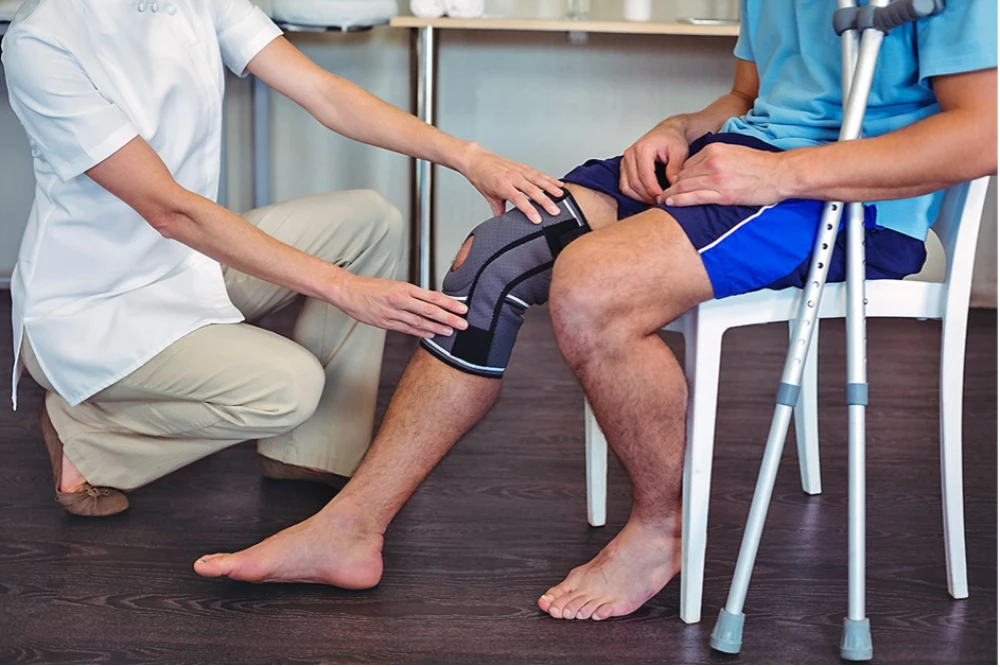Physiotherapy is an essential part of the post-operative rehabilitation phase. Physiotherapy can greatly accelerate the healing process, improve physical function, and avert complications after any surgery, no matter how big or small. This article explores the main benefits of physical therapy following surgery and how it can help patients reach their complete recovery goals. Why is physiotherapy important after surgery? Let’s investigate.

10 Reasons to Have Physiotherapy After Surgery
Many reasons show the importance of physiotherapy after surgery which include:
1. Accelerates Healing
The goal of post-operative physical therapy is to facilitate healing and recovery. Physiotherapists apply various methods to improve tissue healing, decrease edema, and increase blood flow. For example, mild workouts and movements help stop scar tissue from accumulating, which can cause pain and limit movement. Physiotherapy helps the surgery site heal correctly and effectively by promoting optimal tissue alignment and mobility.
2. Lessens Pain
An essential component of post-surgical care is pain management. Physiotherapy provides a variety of non-pharmacological pain relief techniques. Certain exercises, massage therapy, and manual therapy are a few methods that can assist lessen pain and discomfort. In addition, pain and inflammation can be managed with modalities like heat, cold, and electrical stimulation, which will help patients feel better and heal faster.
3. Improves Mobility and Flexibility
Patients frequently have decreased mobility and stiffness following surgery. Physical therapy aims to increase the range of motion by using specific stretches and exercises. These exercises are customized based on each person’s unique requirements and the kind of surgery they had. Enhancing flexibility and mobility helps avoid issues like muscle atrophy and joint stiffness in addition to being helpful for day-to-day tasks.

4. Prevents Complications
Post-surgical complications, such as blood clots, infections, and pneumonia, can be serious and potentially life-threatening. Why is physical therapy important after surgery Physiotherapy? Physiotherapy functions as a preventive measure by promoting mobility and exercise. Early mobilization, under the supervision of a physiotherapist, can enhance lung function and lower the chance of blood clots, which in turn lowers the risk of respiratory issues.
5. Enhances Strength and Endurance
A period of immobility following surgery frequently results in muscle weakening and endurance loss. Strength training activities are part of physiotherapy, which aims to increase general endurance and regenerate muscle strength. Based on the patient’s development, these exercises are progressively increased in intensity, guaranteeing a secure and efficient recovery. For patients to recover their independence and resume their regular activities, increased strength and endurance are essential.
6. Encourages Harmony and Equilibrium
After surgery, balance and coordination may be severely compromised, especially if the musculoskeletal or neurological systems are implicated. Exercises aimed at enhancing balance and coordination are a part of physiotherapy, as these skills are critical in preventing falls and injuries. Patients can decrease the danger and recover confidence in carrying out daily duties by focusing on these areas.
7. Tailored Recuperation Strategies
The individualized approach to healing provided by physiotherapy is one of its main advantages. Physiotherapists develop individualized rehabilitation plans by evaluating the state of each patient, surgery history, and personal objectives. By tailoring the rehabilitation process to the individual needs of the patient, this individualized approach maximizes the therapeutic outcome. Constant evaluations and plan modifications guarantee ongoing development and ideal results.
8. Knowledge and Self-determination
Why is physiotherapy important after surgery? Physiotherapy includes teaching patients about their disease and the course of their rehabilitation in addition to providing them with physical activities. Physiotherapists offer insightful advice on posture, body mechanics, and lifestyle changes that can aid in healing and avert further problems. By enabling patients to actively participate in their healing process, this education fosters long-term health and well-being.
9. Psychological Benefits
The psychological impact of surgery and the subsequent recovery process should not be underestimated. Physiotherapy provides psychological benefits by improving physical function and reducing pain, which can significantly boost a patient’s mood and confidence. The supportive relationship between the patient and the physiotherapist can also provide emotional reassurance and motivation, aiding in mental and emotional recovery.

10. Facilitates Return to Daily Activities and Work
Finally, the goal of post-surgical physiotherapy is to help patients return to their daily activities and work as soon as possible. By refining strength, mobility, and overall function, physiotherapy empowers patients to resume their normal routines with minimal discomfort and risk of re-injury. This return to normality is dynamic for the patient’s quality of life and overall well-being.
Physiotherapy after surgery improves healing, pain relief, mobility, flexibility, strength, endurance, and psychological benefits, promoting long-term health and well-being through individualized rehabilitation strategies.
Which Health Conditions Need Physiotherapy?
Why is physical therapy important after surgery? Many health issues can be better by physiotherapy including:
1. Orthopedic Conditions
Orthopedic surgeries often require extensive physiotherapy for effective rehabilitation.
- Total Joint Replacements (Hip, Knee, Shoulder): Physiotherapy is vital to restore joint function, reduce pain, and improve mobility following joint replacement surgeries.
- Fracture Repairs: After surgery to fix fractures, physiotherapy helps ptients to regain strength, flexibility, and functionality in the affected limb.
- Spinal Surgeries (e.g., spinal fusion, laminectomy): Post-operative physiotherapy is critical for pain reduction, improved mobility, and muscle strengthening around the spine.
2. Cardiovascular Conditions
Why is physical therapy important after surgery of cardiovascular situations?
- Coronary Artery Bypass Grafting (CABG): Physiotherapy improves cardiovascular fitness, lung function, and overall physical endurance after bypass surgery.
- Heart Valve Surgery: Rehabilitation safely increases physical activity levels, which is vital for heart health.
3. Neurological Conditions
Specialized physical rehabilitation is frequently required after neurological procedures.
- Brain Surgery: Following brain surgery, post-operative physical therapy enhances balance, strength, coordination, and cognitive function.
- Spinal Cord Surgery: With an emphasis on retraining motions, physiotherapy maximizes mobility, strength, and independence.
4. Pulmonary Conditions
Physiotherapy is essential for recovery from various pulmonary surgeries:
- Lung Resection (e.g., lobectomy): Respiratory physiotherapy enhances lung function, improves breathing techniques, and prevents post-operative pneumonia.
- Thoracic Surgery: Post-surgical physiotherapy focuses on chest expansion exercises, respiratory exercises, and physical conditioning.
5. Gastrointestinal Conditions
Why is physical therapy important after surgery for digestive disorders?
- Surgery of the abdomen (such as bowel resection): Early mobilization, strengthening of the core, and avoiding problems such as ileus are all facilitated by physiotherapy.
- Hernia Repairs: To ensure optimal movement mechanics and strengthen the abdominal muscles, rehabilitation is necessary to stop the condition from recurring.
6. Cancer-Related Surgeries
Physiotherapy is crucial after cancer surgeries to manage side effects and improve quality of life.
- Mastectomy or Lumpectomy (breast cancer): Physiotherapy reduces shoulder stiffness, improves arm mobility, and manages lymphedema.
- Head and Neck Cancer Surgeries: Post-operative physiotherapy improves swallowing, speech, and shoulder function.
Physiotherapy is crucial for various health conditions, including orthopedic, cardiovascular, neurological, pulmonary, gastrointestinal, and cancer-related surgeries, promoting rehabilitation, pain reduction, etc.

Conclusion
Why is physical therapy important after surgery? It is a crucial component of the post-surgical recovery process. It accelerates healing, reduces pain, improves mobility and flexibility, and prevents complications. Additionally, physiotherapy enhances strength and endurance, promotes balance and coordination, and offers personalized recovery plans. Beyond the physical benefits, physiotherapy provides education and psychological support, empowering patients throughout their recovery journey. By facilitating a quicker and more effective return to daily activities and work, physiotherapy plays a vital role in ensuring a successful post-surgical outcome.
Physiotherapy After Surgery in West Vancouver Clinic
Following surgery, physical therapy is crucial for the best possible recovery, and West Vancouver Clinic provides customized services. The skilled physical therapists at the clinic offer detailed rehabilitation plans intended to improve function, lessen discomfort, and avoid problems. Patients receive individualized care programs that include exercises, manual therapy, and instruction on optimal movement skills, regardless of whether they are recovering from orthopedic, cardiovascular, neurological, or other types of surgery. By guaranteeing that patients regain strength, mobility, and confidence, this inclusive approach improves overall quality of life and allows for a quicker return to regular activities. Call us today to set up a session.